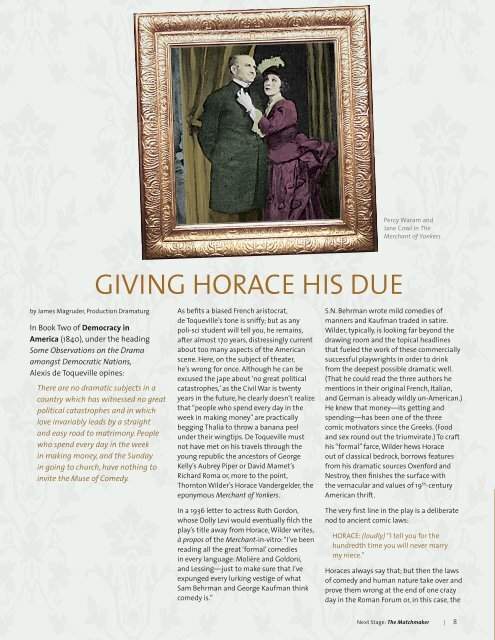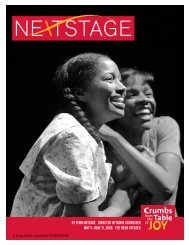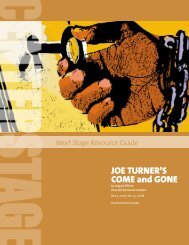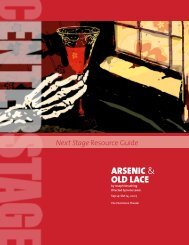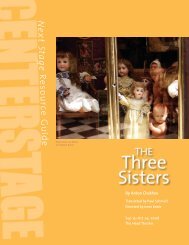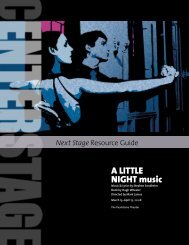The Matchmaker - Center Stage
The Matchmaker - Center Stage
The Matchmaker - Center Stage
Create successful ePaper yourself
Turn your PDF publications into a flip-book with our unique Google optimized e-Paper software.
y James Magruder, Production Dramaturg<br />
In Book Two of Democracy in<br />
America (1840), under the heading<br />
Some Observations on the Drama<br />
amongst Democratic Nations,<br />
Alexis de Toqueville opines:<br />
GIVING HORACE HIS DUE<br />
<strong>The</strong>re are no dramatic subjects in a<br />
country which has witnessed no great<br />
political catastrophes and in which<br />
love invariably leads by a straight<br />
and easy road to matrimony. People<br />
who spend every day in the week<br />
in making money, and the Sunday<br />
in going to church, have nothing to<br />
invite the Muse of Comedy.<br />
As befits a biased French aristocrat,<br />
de Toqueville’s tone is sniffy; but as any<br />
poli-sci student will tell you, he remains,<br />
after almost 170 years, distressingly current<br />
about too many aspects of the American<br />
scene. Here, on the subject of theater,<br />
he’s wrong for once. Although he can be<br />
excused the jape about ‘no great political<br />
catastrophes,’ as the Civil War is twenty<br />
years in the future, he clearly doesn’t realize<br />
that “people who spend every day in the<br />
week in making money” are practically<br />
begging Thalia to throw a banana peel<br />
under their wingtips. De Toqueville must<br />
not have met on his travels through the<br />
young republic the ancestors of George<br />
Kelly’s Aubrey Piper or David Mamet’s<br />
Richard Roma or, more to the point,<br />
Thornton Wilder’s Horace Vandergelder, the<br />
eponymous Merchant of Yonkers.<br />
In a 1936 letter to actress Ruth Gordon,<br />
whose Dolly Levi would eventually filch the<br />
play’s title away from Horace, Wilder writes,<br />
à propos of the Merchant-in-vitro: “I’ve been<br />
reading all the great ‘formal’ comedies<br />
in every language: Molière and Goldoni,<br />
and Lessing—just to make sure that I’ve<br />
expunged every lurking vestige of what<br />
Sam Behrman and George Kaufman think<br />
comedy is.”<br />
Percy Waram and<br />
Jane Cowl in <strong>The</strong><br />
Merchant of Yonkers<br />
S.N. Behrman wrote mild comedies of<br />
manners and Kaufman traded in satire.<br />
Wilder, typically, is looking far beyond the<br />
drawing room and the topical headlines<br />
that fueled the work of these commercially<br />
successful playwrights in order to drink<br />
from the deepest possible dramatic well.<br />
(That he could read the three authors he<br />
mentions in their original French, Italian,<br />
and German is already wildly un-American.)<br />
He knew that money—its getting and<br />
spending—has been one of the three<br />
comic motivators since the Greeks. (Food<br />
and sex round out the triumvirate.) To craft<br />
his “formal” farce, Wilder hews Horace<br />
out of classical bedrock, borrows features<br />
from his dramatic sources Oxenford and<br />
Nestroy, then finishes the surface with<br />
the vernacular and values of 19 th -century<br />
American thrift.<br />
<strong>The</strong> very first line in the play is a deliberate<br />
nod to ancient comic laws:<br />
HORACE: (loudly) “I tell you for the<br />
hundredth time you will never marry<br />
my niece.”<br />
Horaces always say that; but then the laws<br />
of comedy and human nature take over and<br />
prove them wrong at the end of one crazy<br />
day in the Roman Forum or, in this case, the<br />
Next <strong>Stage</strong>: <strong>The</strong> <strong>Matchmaker</strong> |


